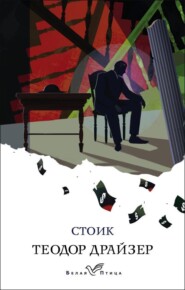По всем вопросам обращайтесь на: info@litportal.ru
(©) 2003-2024.
✖
An American Tragedy I
Настройки чтения
Размер шрифта
Высота строк
Поля
And it was the ground floor of this building, looking out into Bickel Street at the front and some dreary back yards of equally dreary frame houses, which was divided at the front into a hall forty by twenty-five feet in size, in which had been placed some sixty collapsible wood chairs, a lectern, a map of Palestine or the Holy Land, and for wall decorations some twenty-five printed but unframed mottoes which read in part:
“WINE IS A MOCKER, STRONG DRINK IS RAGING AND WHOSOEVER IS DECEIVED THEREBY IS NOT WISE.”
“TAKE HOLD OF SHIELD AND BUCKLER, AND STAND UP FOR MINE HELP.” PSALMS 35:2.
“AND YE, MY FLOCK, THE FLOCK OF MY PASTURE, are men, AND I AM YOUR GOD, SAITH THE LORD GOD.” EZEKIEL 34:31.
“O GOD, THOU KNOWEST MY FOOLISHNESS, AND MY SINS ARE NOT HID FROM THEE.” PSALMS 69:5.
“IF YE HAVE FAITH AS A GRAIN OF MUSTARD SEED, YE SHALL SAY UNTO THIS MOUNTAIN, REMOVE HENCE TO YONDER PLACE; AND IT SHALL MOVE; AND NOTHING SHALL BE IMPOSSIBLE TO YOU.” MATTHEW 17:20.
“FOR THE DAY OF THE LORD IS NEAR.” OBADIAH 15.
“FOR THERE SHALL BE NO REWARD TO THE EVIL MAN.” PROVERBS 24:20.
“LOOK, THEN, NOT UPON THE WINE WHEN IT IS RED: IT BITETH LIKE A SERPENT, AND STINGETH LIKE AN ADDER.” PROVERBS 23:31,32.
These mighty adjurations were as silver and gold plates set in a wall of dross.
The rear forty feet of this very commonplace floor was intricately and yet neatly divided into three small bedrooms, a living room which overlooked the backyard and wooden fences of yards no better than those at the back; also, a combination kitchen and dining room exactly ten feet square, and a store room for mission tracts, hymnals, boxes, trunks and whatever else of non-immediate use, but of assumed value, which the family owned. This particular small room lay immediately to the rear of the mission hall itself, and into it before or after speaking or at such times as a conference seemed important, both Mr. and Mrs. Griffiths were wont to retire – also at times to meditate or pray.
How often had Clyde and his sisters and younger brother seen his mother or father, or both, in conference with some derelict or semi-repentant soul who had come for advice or aid, most usually for aid. And here at times, when his mother’s and father’s financial difficulties were greatest, they were to be found thinking, or as Asa Griffiths was wont helplessly to say at times, “praying their way out,” a rather ineffectual way, as Clyde began to think later.
And the whole neighborhood was so dreary and run-down that he hated the thought of living in it, let alone being part of a work that required constant appeals for aid, as well as constant prayer and thanksgiving to sustain it.
Mrs. Elvira Griffiths before she had married Asa had been nothing but an ignorant farm girl, brought up without much thought of religion of any kind. But having fallen in love with him, she had become inoculated with the virus of Evangelism and proselytizing which dominated him, and had followed him gladly and enthusiastically in all of his ventures and through all of his vagaries. Being rather flattered by the knowledge that she could speak and sing, her ability to sway and persuade and control people with the “word of God,” as she saw it, she had become more or less pleased with herself on this account and so persuaded to continue.
Occasionally a small band of people followed the preachers to their mission, or learning of its existence through their street work, appeared there later – those odd and mentally disturbed or distrait souls who are to be found in every place. And it had been Clyde’s compulsory duty throughout the years when he could not act for himself to be in attendance at these various meetings. And always he had been more irritated than favorably influenced by the types of men and women who came here – mostly men – down-and-out laborers, loafers, drunkards, wastrels, the botched and helpless who seemed to drift in, because they had no other place to go. And they were always testifying as to how God or Christ or Divine Grace had rescued them from this or that predicament – never how they had rescued any one else. And always his father and mother were saying “Amen” and “Glory to God,” and singing hymns and afterward taking up a collection for the legitimate expenses of the hall – collections which, as he surmised, were little enough – barely enough to keep the various missions they had conducted in existence.
The one thing that really interested him in connection with his parents was the existence somewhere in the east – in a small city called Lycurgus, near Utica he understood – of an uncle, a brother of his father’s, who was plainly different from all this. That uncle – Samuel Griffiths by name – was rich. In one way and another, from casual remarks dropped by his parents, Clyde had heard references to certain things this particular uncle might do for a person, if he but would; references to the fact that he was a shrewd, hard business man; that he had a great house and a large factory in Lycurgus for the manufacture of collars and shirts, which employed not less than three hundred people; that he had a son who must be about Clyde’s age, and several daughters, two at least, all of whom must be, as Clyde imagined, living in luxury in Lycurgus. News of all this had apparently been brought west in some way by people who knew Asa and his father and brother. As Clyde pictured this uncle, he must be a kind of Croesus, living in ease and luxury there in the east, while here in the west – Kansas City – he and his parents and his brother and sisters were living in the same wretched and hum-drum, hand-to-mouth state that had always characterized their lives.
But for this – apart from anything he might do for himself, as he early began to see – there was no remedy. For at fifteen, and even a little earlier, Clyde began to understand that his education, as well as his sisters’ and brother’s, had been sadly neglected. And it would be rather hard for him to overcome this handicap, seeing that other boys and girls with more money and better homes were being trained for special kinds of work. How was one to get a start under such circumstances? Already when, at the age of thirteen, fourteen and fifteen, he began looking in the papers, which, being too worldly, had never been admitted to his home, he found that mostly skilled help was wanted, or boys to learn trades in which at the moment he was not very much interested. For true to the standard of the American youth, or the general American attitude toward life, he felt himself above the type of labor which was purely manual. What! Run a machine, lay bricks, learn to be a carpenter, or a plasterer, or plumber, when boys no better than himself were clerks and druggists’ assistants and bookkeepers and assistants in banks and real estate offices and such! Wasn’t it menial, as miserable as the life he had thus far been leading, to wear old clothes and get up so early in the morning and do all the commonplace things such people had to do?
For Clyde was as vain and proud as he was poor. He was one of those interesting individuals who looked upon himself as a thing apart – never quite wholly and indissolubly merged with the family of which he was a member, and never with any profound obligations to those who had been responsible for his coming into the world. On the contrary, he was inclined to study his parents, not too sharply or bitterly, but with a very fair grasp of their qualities and capabilities. And yet, with so much judgment in that direction, he was never quite able – at least not until he had reached his sixteenth year – to formulate any policy in regard to himself, and then only in a rather fumbling and tentative way.
Incidentally by that time the sex lure or appeal had begun to manifest itself and he was already intensely interested and troubled by the beauty of the opposite sex, its attractions for him and his attraction for it. And, naturally and coincidentally, the matter of his clothes and his physical appearance had begun to trouble him not a little – how he looked and how other boys looked. It was painful to him now to think that his clothes were not right; that he was not as handsome as he might be, not as interesting. What a wretched thing it was to be born poor and not to have any one to do anything for you and not to be able to do so very much for yourself!
Casual examination of himself in mirrors whenever he found them tended rather to assure him that he was not so bad-looking – a straight, well-cut nose, high white forehead, wavy, glossy, black hair, eyes that were black and rather melancholy at times. And yet the fact that his family was the unhappy thing that it was, that he had never had any real friends, and could not have any, as he saw it, because of the work and connection of his parents, was now tending more and more to induce a kind of mental depression or melancholia which promised not so well for his future. It served to make him rebellious and hence lethargic at times. Because of his parents, and in spite of his looks, which were really agreeable and more appealing than most, he was inclined to misinterpret the interested looks which were cast at him occasionally by young girls in very different walks of life from him – the contemptuous and yet rather inviting way in which they looked to see if he were interested or disinterested, brave or cowardly.
And yet, before he had ever earned any money at all, he had always told himself that if only he had a better collar, a nicer shirt, finer shoes, a good suit, a swell overcoat like some boys had! Oh, the fine clothes, the handsome homes, the watches, rings, pins that some boys sported; the dandies many youths of his years already were! Some parents of boys of his years actually gave them cars of their own to ride in. They were to be seen upon the principal streets of Kansas City flitting to and fro like flies. And pretty girls with them. And he had nothing. And he never had had.
And yet the world was so full of so many things to do – so many people were so happy and so successful. What was he to do? Which way to turn? What one thing to take up and master – something that would get him somewhere. He could not say. He did not know exactly. And these peculiar parents were in no way sufficiently equipped to advise him.
Chapter 3
One of the things that served to darken Clyde’s mood just about the time when he was seeking some practical solution for himself, to say nothing of its profoundly disheartening effect on the Griffiths family as a whole, was the fact that his sister Esta, in whom he took no little interest (although they really had very little in common), ran away from home with an actor who happened to be playing in Kansas City and who took a passing fancy for her.
The truth in regard to Esta was that in spite of her guarded up-bringing, and the seeming religious and moral fervor which at times appeared to characterize her, she was just a sensuous, weak girl who did not by any means know yet what she thought. Despite the atmosphere in which she moved, essentially she was not of it. Like the large majority of those who profess and daily repeat the dogmas and creeds of the world, she had come into her practices and imagined attitude so insensibly from her earliest childhood on, that up to this time, and even later, she did not know the meaning of it all. For the necessity of thought had been obviated by advice and law, or “revealed” truth, and so long as other theories or situations and impulses of an external or even internal, character did not arise to clash with these, she was safe enough. Once they did, however, it was a foregone conclusion that her religious notions, not being grounded on any conviction or temperamental bias of her own, were not likely to withstand the shock. So that all the while, and not unlike her brother Clyde, her thoughts as well as her emotions were wandering here and there – to love, to comfort – to things which in the main had little, if anything, to do with any self-abnegating and self-immolating religious theory. Within her was a chemism of dreams which somehow counteracted all they had to say.
Yet she had neither Clyde’s force, nor, on the other hand, his resistance. She was in the main a drifter, with a vague yearning toward pretty dresses, hats, shoes, ribbons and the like, and super-imposed above this, the religious theory or notion that she should not be. There were the long bright streets of a morning and afternoon after school or of an evening. The charm of certain girls swinging along together, arms locked, secrets a-whispering, or that of boys, clownish, yet revealing through their bounding ridiculous animality the force and meaning of that chemistry and urge toward mating which lies back of all youthful thought and action. And in herself, as from time to time she observed lovers or flirtation-seekers who lingered at street corners or about doorways, and who looked at her in a longing and seeking way, there was a stirring, a nerve plasm palpitation that spoke loudly for all the seemingly material things of life, not for the thin pleasantries of heaven.
And the glances drilled her like an invisible ray, for she was pleasing to look at and was growing more attractive hourly. And the moods in others awakened responsive moods in her, those rearranging chemisms upon which all the morality or immorality of the world is based.
And then one day, as she was coming home from school, a youth of that plausible variety known as “masher” engaged her in conversation, largely because of a look and a mood which seemed to invite it. And there was little to stay her, for she was essentially yielding, if not amorous. Yet so great had been her home drilling as to the need of modesty, circumspection, purity and the like, that on this occasion at least there was no danger of any immediate lapse. Only this attack once made, others followed, were accepted, or not so quickly fled from, and by degrees, these served to break down that wall of reserve which her home training had served to erect. She became secretive and hid her ways from her parents.
Youths occasionally walked and talked with her in spite of herself. They demolished that excessive shyness which had been hers, and which had served to put others aside for a time at least. She wished for other contacts – dreamed of some bright, gay, wonderful love of some kind, with some one.
Finally, after a slow but vigorous internal growth of mood and desire, there came this actor, one of those vain, handsome, animal personalities, all clothes and airs, but no morals (no taste, no courtesy or real tenderness even), but of compelling magnetism, who was able within the space of one brief week and a few meetings to completely befuddle and enmesh her so that she was really his to do with as he wished. And the truth was that he scarcely cared for her at all. To him, dull as he was, she was just another girl – fairly pretty, obviously sensuous and inexperienced, a silly who could be taken by a few soft words – a show of seemingly sincere affection, talk of the opportunity of a broader, freer life on the road, in other great cities, as his wife.
And yet his words were those of a lover who would be true forever. All she had to do, as he explained to her, was to come away with him and be his bride, at once – now. Delay was so vain when two such as they had met. There was difficulty about marriage here, which he could not explain – it related to friends – but in St. Louis he had a preacher friend who would wed them. She was to have new and better clothes than she had ever known, delicious adventures, love. She would travel with him and see the great world. She would never need to trouble more about anything save him; and while it was truth to her – the verbal surety of a genuine passion – to him it was the most ancient and serviceable type of blarney, often used before and often successful.
In a single week then, at odd hours, morning, afternoon and night, this chemic witchery was accomplished.
Coming home rather late one Saturday night in April from a walk which he had taken about the business heart, in order to escape the regular Saturday night mission services, Clyde found his mother and father worried about the whereabouts of Esta. She had played and sung as usual at this meeting. And all had seemed all right with her. After the meeting she had gone to her room, saying that she was not feeling very well and was going to bed early. But by eleven o’clock, when Clyde returned, her mother had chanced to look into her room and discovered that she was not there nor anywhere about the place. A certain bareness in connection with the room – some trinkets and dresses removed, an old and familiar suitcase gone – had first attracted her mother’s attention. Then the house search proving that she was not there, Asa had gone outside to look up and down the street. She sometimes walked out alone, or sat or stood in front of the mission during its idle or closed hours.
This search revealing nothing, Clyde and he had walked to a corner, then along Missouri Avenue. No Esta. At twelve they returned and after that, naturally, the curiosity in regard to her grew momentarily sharper.
At first they assumed that she might have taken an unexplained walk somewhere, but as twelve-thirty, and finally one, and one-thirty, passed, and no Esta, they were about to notify the police, when Clyde, going into her room, saw a note pinned to the pillow of her small wooden bed – a missive that had escaped the eye of his mother. At once he went to it, curious and comprehending, for he had often wondered in what way, assuming that he ever wished to depart surreptitiously, he would notify his parents, for he knew they would never countenance his departure unless they were permitted to supervise it in every detail. And now here was Esta missing, and here was undoubtedly some such communication as he might have left. He picked it up, eager to read it, but at that moment his mother came into the room and, seeing it in his hand, exclaimed: “What’s that? A note? Is it from her?” He surrendered it and she unfolded it, reading it quickly. He noted that her strong broad face, always tanned a reddish brown, blanched as she turned away toward the outer room. Her biggish mouth was now set in a firm, straight line. Her large, strong hand shook the least bit as it held the small note aloft.
“Asa!” she called, and then tramping into the next room where he was, his frizzled grayish hair curling distractedly above his round head, she said: “Read this.”
Clyde, who had followed, saw him take it a little nervously in his pudgy hands, his lips, always weak and beginning to crinkle at the center with age, now working curiously. Any one who had known his life’s history would have said it was the expression, slightly emphasized, with which he had received most of the untoward blows of his life in the past.
“Tst! Tst! Tst!” was the only sound he made at first, a sucking sound of the tongue and palate – most weak and inadequate, it seemed to Clyde. Next there was another “Tst! Tst! Tst!”, his head beginning to shake from side to side. Then, “Now, what do you suppose could have caused her to do that?” Then he turned and gazed at his wife, who gazed blankly in return. Then, walking to and fro, his hands behind him, his short legs taking unconscious and queerly long steps, his head moving again, he gave vent to another ineffectual “Tst! Tst! Tst!”
Always the more impressive, Mrs. Griffiths now showed herself markedly different and more vital in this trying situation, a kind of irritation or dissatisfaction with life itself, along with an obvious physical distress, seeming to pass through her like a visible shadow. Once her husband had gotten up, she reached out and took the note, then merely glared at it again, her face set in hard yet stricken and disturbing lines. Her manner was that of one who is intensely disquieted and dissatisfied, one who fingers savagely at a material knot and yet cannot undo it, one who seeks restraint and freedom from complaint and yet who would complain bitterly, angrily. For behind her were all those years of religious work and faith, which somehow, in her poorly integrated conscience, seemed dimly to indicate that she should justly have been spared this. Where was her God, her Christ, at this hour when this obvious evil was being done? Why had He not acted for her? How was He to explain this? His Biblical promises! His perpetual guidance! His declared mercies!
In the face of so great a calamity, it was very hard for her, as Clyde could see, to get this straightened out, instantly at least. Although, as Clyde had come to know, it could be done eventually, of course. For in some blind, dualistic way both she and Asa insisted, as do all religionists, in disassociating God from harm and error and misery, while granting Him nevertheless supreme control. They would seek for something else – some malign, treacherous, deceiving power which, in the face of God’s omniscience and omnipotence, still beguiles and betrays – and find it eventually in the error and perverseness of the human heart, which God has made, yet which He does not control, because He does not want to control it.
At the moment, however, only hurt and rage were with her, and yet her lips did not twitch as did Asa’s, nor did her eyes show that profound distress which filled his. Instead she retreated a step and reexamined the letter, almost angrily, then said to Asa: “She’s run away with some one and she doesn’t say – ” Then she stopped suddenly, remembering the presence of the children – Clyde, Julia, and Frank, all present and all gazing curiously, intently, unbelievingly. “Come in here,” she called to her husband, “I want to talk to you a minute. You children had better go on to bed. We’ll be out in a minute.”
With Asa then she retired quite precipitately to a small room back of the mission hall. They heard her click the electric bulb. Then their voices were heard in low converse, while Clyde and Julia and Frank looked at each other, although Frank, being so young – only ten – could scarcely be said to have comprehended fully. Even Julia hardly gathered the full import of it. But Clyde, because of his larger contact with life and his mother’s statement (“She’s run away with some one”), understood well enough. Esta had tired of all this, as had he. Perhaps there was some one, like one of those dandies whom he saw on the streets with the prettiest girls, with whom she had gone. But where? And what was he like? That note told something, and yet his mother had not let him see it. She had taken it away too quickly. If only he had looked first, silently and to himself!
“Do you suppose she’s run away for good?” he asked Julia dubiously, the while his parents were out of the room, Julia herself looking so blank and strange.
“How should I know?” she replied a little irritably, troubled by her parents’ distress and this secretiveness, as well as Esta’s action. “She never said anything to me. I should think she’d be ashamed of herself if she has.”
Julia, being colder emotionally than either Esta or Clyde, was more considerate of her parents in a conventional way, and hence sorrier. True, she did not quite gather what it meant, but she suspected something, for she had talked occasionally with girls, but in a very guarded and conservative way. Now, however, it was more the way in which Esta had chosen to leave, deserting her parents and her brothers and herself, that caused her to be angry with her, for why should she go and do anything which would distress her parents in this dreadful fashion. It was dreadful. The air was thick with misery.
And as his parents talked in their little room, Clyde brooded too, for he was intensely curious about life now. What was it Esta had really done? Was it, as he feared and thought, one of those dreadful runaway or sexually disagreeable affairs which the boys on the streets and at school were always slyly talking about? How shameful, if that were true! She might never come back. She had gone with some man. There was something wrong about that, no doubt, for a girl, anyhow, for all he had ever heard was that all decent contacts between boys and girls, men and women, led to but one thing – marriage. And now Esta, in addition to their other troubles, had gone and done this. Certainly this home life of theirs was pretty dark now, and it would be darker instead of brighter because of this.
Presently the parents came out, and then Mrs. Griffiths’ face, if still set and constrained, was somehow a little different, less savage perhaps, more hopelessly resigned.
“Esta’s seen fit to leave us, for a little while, anyhow,” was all she said at first, seeing the children waiting curiously. “Now, you’re not to worry about her at all, or think any more about it. She’ll come back after a while, I’m sure. She has chosen to go her own way, for a time, for some reason. The Lord’s will be done.” (“Blessed be the name of the Lord!” interpolated Asa.) “I thought she was happy here with us, but apparently she wasn’t. She must see something of the world for herself, I suppose.” (Here Asa put in another Tst! Tst! Tst!) “But we mustn’t harbor hard thoughts. That won’t do any good now – only thoughts of love and kindness.” Yet she said this with a kind of sternness that somehow belied it – a click of the voice, as it were. “We can only hope that she will soon see how foolish she has been, and unthinking, and come back. She can’t prosper on the course she’s going now. It isn’t the Lord’s way or will. She’s too young and she’s made a mistake. But we can forgive her. We must. Our hearts must be kept open, soft and tender.” She talked as though she were addressing a meeting, but with a hard, sad, frozen face and voice. “Now, all of you go to bed. We can only pray now, and hope, morning, noon and night, that no evil will befall her. I wish she hadn’t done that,” she added, quite out of keeping with the rest of her statement and really not thinking of the children as present at all – just of Esta.
But Asa!
Such a father, as Clyde often thought, afterwards.

















